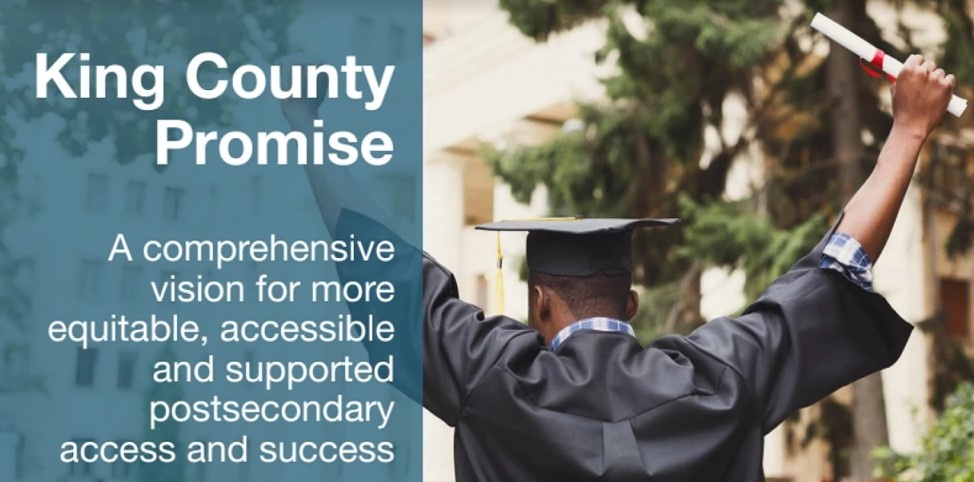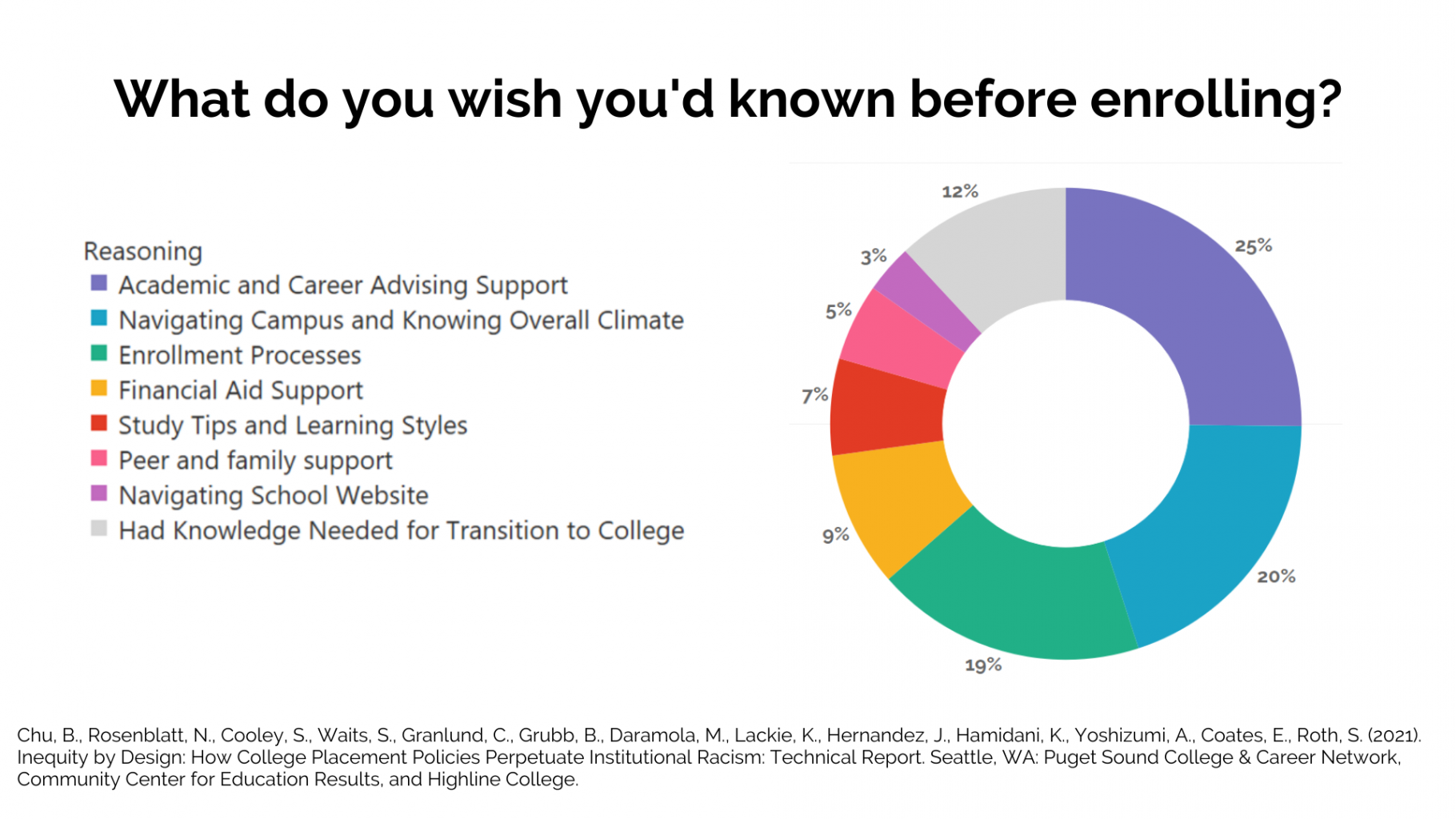
This post is part of the Data for Action series, which offers topical briefs that are responsive to community concerns and emerging advocacy priorities. This post was authored by the team at Puget Sound College & Career Network.
King County Promise (KCP) is a public-private partnership engaging King County K-12 districts, community-based organizations (CBOs), and Community and Technical Colleges (CTCs) to develop a comprehensive student support model, supporting historically underserved young people to obtain postsecondary credentials. Since 2017, the Puget Sound College & Career Network (PSCCN) has co-developed KCP with hundreds of King County students, parents, educators, and systems leaders, based on the national College Promise and local South Seattle College 13th Year Scholarship models.
King County Promise is organized around two high-level impact goals:
- Student-level: Increase postsecondary attainment of KCP served youth to 70%, with no gap in attainment rates across racial groups.
- System-level: K-12 districts, postsecondary institutions, and community-based organizations in King County collaborate to create a cohesive,
equity-focused P-16 educational system that supports postsecondary transitions and success for young people.
Our overarching, long-term goal is to demonstrate to Washington State that the King County Promise model’s strategies and outcomes can be sustained and replicated across the state, ensuring all of Washington’s young people have access to a high-quality postsecondary education that leads to family-wage jobs in the high-demand labor market.
How does data ensure we are making the progress that students need?
When talking with college students who attend community and technical colleges within the Road Map Project region, they shared what they wished they had known more about before enrolling in college. As outlined in the Inequity by Design (technical) report, students lacked the array of supports to help them make informed decisions about their post-secondary paths and prepare for these paths.
As shown in the figure below, the supports that students reported needing span both high school and college. One in four students wished they had advising supports before enrolling in college, pointing to the need for additional advising supports in high school. Nearly 1 in 5 wished they had known more about their college’s enrollment process, highlighting the need for improved supports at the college and between high school and college teams.

Drawing on both the data above and current work across the region, King County Promise is designed to both impact and engage many different communities across the education pipeline as partner learners – students and young people, their families, educators that support them, education leaders, and other education community members.
King County Promise is committed to using both quantitative and qualitative data to inform where progress is needed, and to develop measurements to hold the KCP community accountable to what students have said they need. To do that, KCP partners will collaborate to collect and use data in the following ways:
Quantitative data collected will ensure students from King County Promise’s focus population are getting equitable access to KCP, and will provide partnerships with information to support students throughout their education pipeline, in high school, in transition, and once in college. This approach will allow partners working with students to identify both the specific supports needed, and how those supports are actually working for students.
Qualitative data will tell us about the experience of the students, young people, and the educators supporting them within King County Promise, to inform continuous improvements to the Promise program. Collecting and using this information in real time will show us whether the overall high school and college systems are changing to better support students’ needs.
Who are KCP’s stakeholders?
KCP Partnerships will engage three groups of stakeholders: students, educators, and system leaders:
Students
KCP’s supports are focused on youth and young people across King County (age 16-26) who have been historically underserved, including youth of color, and youth from families at or below 200% of FPL or who have experienced homelessness or foster care, as well as students with disabilities or who are LGBTQ+.
KCP will provide racially equitable postsecondary advising, transition & navigation supports, informed by students and best practices to K12, CTC students, and opportunity youth which includes:
- Case management and programming support from collaborative K12, CTC, and CBO advisors.
- Yearly equity stipend: $1,000 non-tuition for Promise-enrolled CTC students engaged in Promise advising services.
- High-quality postsecondary readiness and completion curriculum, co-developed by students and educators, providing culturally and
postsecondary success grounded content and strategies delivered across Promise partnerships.
Students and young people will also have the opportunity to be part of and lead in the KCP Youth Advisory Group. This group will collaborate with, guide, and provide a reality check on programmatic decisions based on lived experience and community context.
Educators
Through King County Promise, educators within partnerships will collect, track and share data about their shared student caseloads, and support received from King County Promise activities. Educators will also be supported through ongoing learning opportunities to review outcomes, share strategies, and provide feedback to support ongoing collaboration and continuous improvement, grounded in racially equitable practices.
Leaders
As the System Supporting Organization (SSO), PSCCN will provide essential support for Promise Partnerships, leading system building and improvement efforts over time through ongoing collaboration including:
- Developing a student-centered and action-oriented centralized data sharing and management approach. This data approach will facilitate coordinated and responsive student-level advising support, improve access to relevant data, and support streamlined course placement policies, and transcript access.
- Providing data-informed, cross-system, and ongoing professional development for King County Promise educators, using continuous improvement strategies. Supported by qualitative and quantitative data, these professional development activities will engage the KCP community to identify and address systemic barriers by building on and creating new, sustainable ways for systems to work together, support organizational collaboration, and share out on progress in implementing Promise strategies.
Where is KCP now?
After more than four years of co-developed work, PSCCN and the King County Department of Human and Community Services (DCHS) opened doors to welcome partnership applications for the first phase of King County Promise on February 17. The RFP closes on April 4 at 2 p.m. For all official information about the RFP, please visit the DCHS Contracts Page and/or contact RFP lead Andria Howertown at dchscontracts@kingcounty.gov.
Posted in: Data and Research , Data for Action